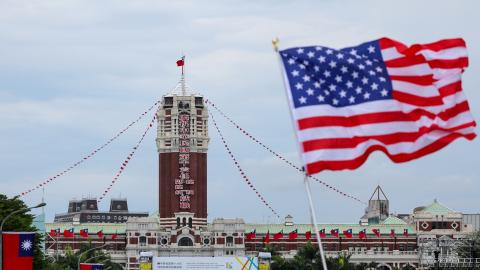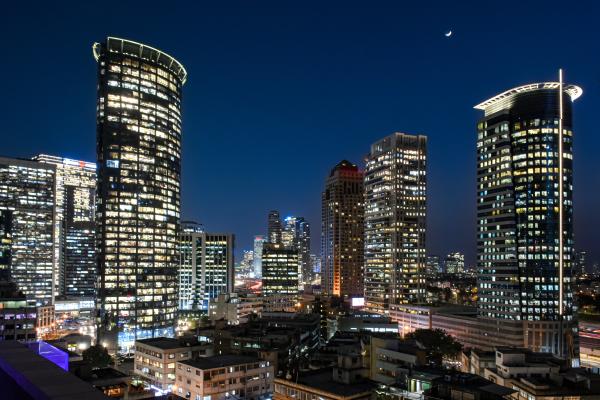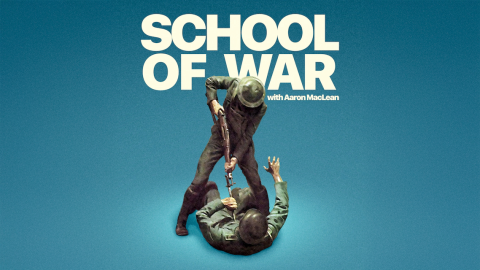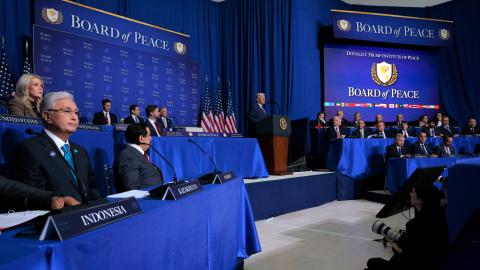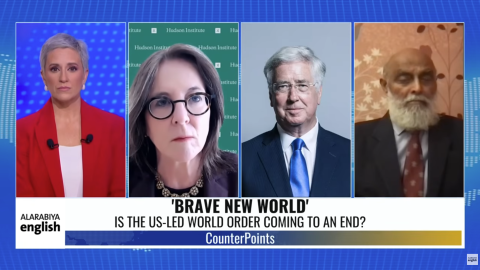
The Black Sea Region as a Global Inflection Point
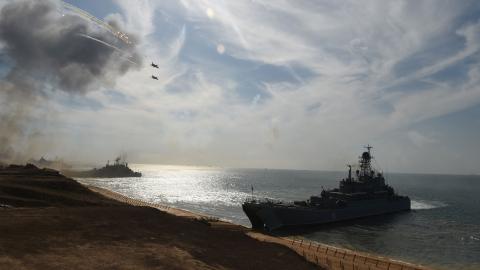
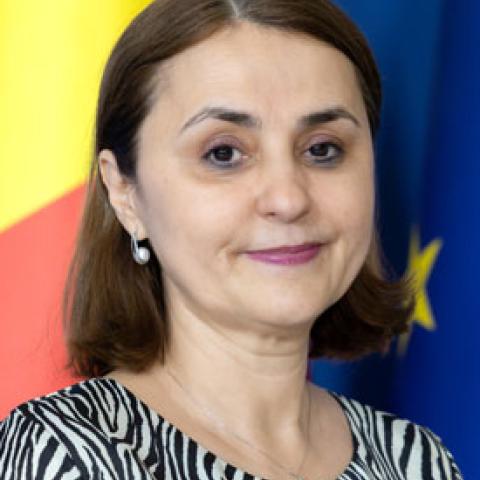
Foreign Minister, Romania

Former Senior Fellow
Jamie Fly was a senior fellow at Hudson Institute.

Senior Fellow and Director, Center on Europe and Eurasia
Peter Rough is a senior fellow and director of the Center on Europe and Eurasia at Hudson Institute.
Long a crossroads between East and West the Black Sea region today occupies a
Long a crossroads between East and West, the Black Sea region today occupies a crucial geography from which the future security and prosperity of the transatlantic community will radiate. Russia’s unrelenting, unprovoked war against Ukraine has focused the world on the Black Sea. In the process, the world has grown to appreciate the role of Romania as a shoreline of stability.
Twenty years after joining the North Atlantic Treaty Organization, Romania is one of America’s strongest and closest allies, with an ambitious and ongoing defense modernization program centered on American-made capabilities. The strategic partnership between the United States and Romania has further manifested itself through economic and security agreements, joint exercises, and a US presence at key bases in Romania.
Join Hudson for a discussion with Romanian Foreign Minister Luminiţa-Teodora Odobescu on why Russia’s war against Ukraine and the broader contest for the future of the Black Sea region is a global inflection point with far-reaching ramifications. The West today faces a stark choice: disengage and watch the Black Sea radiate instability and embolden autocrats, or seize the opportunity to transform the region into a driver of future transatlantic prosperity and security.
Event Transcript
This transcription is automatically generated and edited lightly for accuracy. Please excuse any errors.
Peter Rough:
Good morning and welcome to all of you, particularly thanks to coming for an in-person event here on a Friday morning to Hudson Institute when it's a scalding 95 degrees out. It's great to see you all. I'd like to also welcome those of you who are watching on our streaming service online at hudson.org and those of you who are tuned in across the country via C-SPAN, welcome to Hudson Institute and today's event, The Black Sea Region as a Global Inflection Point, featuring the foreign minister of Romania Luminiţa Odobescu.
Madam Minister, in 2004, your predecessor, now Deputy Secretary General of NATO, Mircea Geoana, at the accession of Romania to NATO, said that his nation, Romania, is a European country with a transatlantic vocation. And you really have lived that vocation. Your forces have served alongside American troops in Iraq and Afghanistan taking 30 casualties. Well, 30 killed in action, many more casualties in both of those conflicts. You remain one of the largest donors with true presence in the Kosovo Force helping stability in the Balkans. And you have taken burden sharing seriously. Just this week, Secretary General Stoltenberg and President Biden presented a new report on burden sharing. Romania has hit 2.25 percent of GDP on defense and 30 percent of those defense spending numbers have gone to equipment, both meeting the Wales Pledge of 2014, and we thank you for your commitment to burden sharing.
Of course, as a border state to Ukraine, you've also played a leading role in supporting Ukraine, and for all those reasons, I think your president, in May, described really the relationship with the United States as a strategic partnership that's never been healthier. I'd like to also think that the relationship between Hudson Institute and Romania has never been healthier, and we thank you very much for your close partnership and your embassy's work with our team here in Washington. In April, we had the great honor of partnering with your embassy on the Hudson Central and Eastern Europe Strategy Summit, and your ambassador was gracious enough to open up his home for a closing dinner of Central and Eastern European officials and American private sector attendees and public intellectuals.
But we don't just do events, ma'am, we also do publications and so, allow me to plug very briefly a major report that Hudson Institute Senior Fellow, Matt Boyse, along with George Scutaru from Romania's New Strategy Center, of course, based in Bucharest and the New Geopolitics Research Network in Ukraine, published in April, The Battle for the Black Sea is Not Over. There are a few copies outside, and if you aren't able to get a copy outside because you're watching this at home or from your office, you can navigate to Hudson.org, The Battle for the Black Sea is Not Over.
It's rare to meet with the Romanian delegation that doesn't bring up the fate of Moldova, and so I thought I would also pitch a new policy memo that my colleague, Luke Coffey, and I have put together and released just this week, How the US Can Beat the Kremlin in Moldova. It's also on hudson.org and it's so hot off the presses that, in fact, it isn't off the presses. I just printed this off online. It's very recent and current. I see Brian Garfield who helped edit this memo here today. Welcome Brian. Thanks to all of you who participated in this work. And scholarship and writing is, of course, at the centerpiece of Hudson's work.
With that, let me just say a word or two about you, Madam Minister. You have served as foreign ministers since June 2023, and most recently, before that, as presidential advisor from November 2021 to June 2023. You've served your country in a number of different roles throughout your career including to help shepherd the chapters on energy, economy and monetary union, taxation and trade during Romania's succession to negotiate European Union membership, and, of course, more recently helping manage the first Romanian presidency of the Council of the EU in 2019.
We're absolutely delighted to have you here in person. Last time, it was virtually, and after a few opening remarks which you'll make from the podium, you'll sit down with our very own Jamie Fly, Senior Fellow here who many of you will know from his previous work as president and CEO of Radio Free Europe, Radio Liberty in Prague, and before that, as national security advisor to Senator Rubio. Madam Minister, the floor is yours and thereafter, Jamie and Madam Minister will have a fireside chat. Thanks so much for being here.
Luminiţa-Teodora Odobescu:
I hope you see me. So, good morning. Ladies and gentlemen, dear friends, it's a privilege for me being here today and able to share some of our views about the fundamental importance of the Black Sea in the current geopolitical environment. And there is a significant overlap with your own analysis. And yes, the battle for the Black Sea is not over. The fact that the Black Sea region is fundamental for Euro-Atlantic security is a point that Romania has been making for decades within NATO, within the EU, in our bilateral dialogue with the United States. Our region, the region of the Black Sea is a vital corridor for the movement of goods and resources both on the east-west and north-south axis, including energy and Ukrainian grain and other products bound for world markets.
The Black Sea links Europe with the South Caucasus and Central Asia and serves as a getaway to the Middle East. It holds significant untapped energy resources and immense economic potential. It is bordered by tree NATO allies and several NATO partners. Also, it is bordered by EU member states and candidate member states. So, with the exceptions of Russia, as I said, all the littoral states are either EU member states or aspire to be. In drafting my intervention today, I started from the key assessment used by the US administration in describing our world today, namely that we found ourselves at an inflection point. And Romania shares this assessment, however, this inflection point is not only a time in history but holds clear boundaries on the map of the world. Today, the key geopolitical inflection point is the Black Sea region. My statement is based on a set of arguments that I will first list and then expand upon.
First, the Black Sea is the only region where a great power, permanent member of UN Security Council, Russia, is engaged in interstate warfare. Moscow's action directly changes the rules by international order and have significant contagious potential. Second, Moscow political aim to reestablish a sphere of influence in the Black Sea region goes beyond challenging the rules-based international order. It is, in fact, an attempt to create an alternative to this order, and the final result will be of global significance. Third, the persistence and global significance of Moscow's assault on the rules by international order has led to an unprecedented alignment with other significant actors that share a revisionist foreign policy. No need to say who are they. China, Iran, North Korea, are all, in one way or another, present in the Black Sioux region and acting in support of Russia attempt to subvert and replace the principle of global governance.
Four, supporting Ukraine is an indispensable but insufficient condition for defending the rules-based international order. In the absence of a regional approach, we risk revisiting the same issues a few years down the line, facing renewed aggression in the Black Sea. A long-term solutions depend on a secure, prosperous and connected Black Sea region. And I just kindly invite you to look back in the history, 2008, 2014, 2022. Fifth, active US leadership and support in coordination with EU, NATO and regional allies and partner is indispensable for long-term security and resilience of the Black Sea region, the US Black Sea security and the development strategy will be instrumental in this regard.
Allow me to expand on the ideas presented previously. First, the unique character of Russia's aggression in the Black Sea region. Unlike the other regions of the world where active and aggressive action against the rules-based international order are still below the threshold of full war, the Black Seas is, as we speak, the location of armed aggression by a great power. The effects of Russia's aggression are global, acute, cascading and mutually reinforcing. All major principles that held together the post-Cold War order are being challenged by Russia in the Black Sea region. International law, state sovereignty, freedom of navigation, just to name only a few.
For my second argument, I would like to draw your attention to the fact that, in the Black Sea, Moscow's aggression has clear political aims. It seeks to create an alternative regional order where states have limited sovereignty, great powers unilaterally imposed against their will and trade and technology are weaponized by the state. The final outcome of Russia's challenge to the rules-based international order in the Black Sea will be mirrored globally. It will have profound and direct implication and effects on US security, not only on our security, but also on US security and on US capacity to lead a diverse global coalition in support of the rules-based international order.
This brings me to my third argument. As the Russia aggressions against Ukraine continues, all major actors currently challenging the rules-based international order have gradually aligned and have a simultaneous active involvement in the Black Sea region in support of the Russian aggression. Iran is supplying drones and technologies. North Korea is supplying ammunition and missiles. Chinese companies are still there. So yes, they are all present in the Black Sea. They leverage shared challenges such as energy, food and technology dependencies, climate change, sanitary vulnerabilities or the fight against inflation or corruption and their presence creates consequences regionally and for global competition.
In our view, the Black Sea region is a textbook case of how the challenges listed in the current US National Security Strategy intersect. We have national competitors aligning in support of aggression, including by leveraging shared challenges in pursuit of their revisionist goal. So, this alignment is a key development. It links the Black Sea to all other geopolitical hotspot and Euro-Atlantic security to Indo-Pacific security. Helping Ukraine is an indispensable condition for defending the international rule order. However, it is not enough. In the absence of a regional approach, we risk, as I said, revisiting the same issues a few years down the line facing renewed aggression in the Black Sea. As long as Russia is willing and able to directly change international norms, other powers will remain aligned with this effort and enable Russia's attempts.
To avoid this scenario, we need to shape the regional environment in a way that makes it impossible for Moscow to renew its aggressive policies. This brings me to my final point, achieving a secure and resilient Black Sea region, which requires an active, predictable US involvement and support, coordinated, of course. With us, with the EU and NATO and regional allies and partners. The US is clearly placed to influence developments in the Black Sea region. It has interest in denying revisionist powers a showcase victory and sphere of influence. Its capacity to engage across the full spectrum of security, stability, economy and energy with all regional allies and partners is unmatched. The adoption of the Black Sea Security Strategy by the US Department of State last year and its future development in answer to the provision of the National Defense Authorization Act of 2024 are indeed very good news for my country, for Romania, and Romania remains ready to contribute to the future development and implementation of the US Black Sea Strategy. Thank you.
Jamie Fly:
Thank you, Madam Foreign Minister, for that great overview. And I especially liked your framing of the need for a secure, prosperous and connected Black Sea region. And so, in my conversation here with you, I think I want to make sure we touch on all of those three elements. Unfortunately, as I was preparing for this and then thinking about that framing, I think a lot of the topics fall under security, unfortunately, because of the events that you described. So, we'll first start there and then broaden it. The one thing, though, I wanted to highlight upfront that we're not going to get into today, but I just want to flag because I think it's important historical context for the US-Romanian relationship. When I was president of Radio Free Europe, Radio Liberty, we returned to Romania, relaunched our Romanian language service, so, I had many occasions where I was able to visit Bucharest, and the thing I think Americans need to understand is Romanians love freedom, and it's now in their DNA. And that was an important bond given the work of Radio Free Europe during the communist era.
I had this experience in many countries I operated in, but Romania was perhaps the most fervent. When I went to Romania as president of Radio Free Europe, people would describe to me, with tears in their eyes, the role that American broadcasting played during a very dark period and were always asking us to do more there. And I was excited that we were able to return during my tenure. And I think that relates to why Romania now has staked out such a clear leadership role in the region, advancing the values that US programming certainly represented during that time. So, it's great to be with you.
So, maybe I'll start broadly just with the state of the US-Romania relationship, which you touched on at the end. But I was struck by your note that US engagement needs to be basically reliable, predictable, and not to get partisan or make you say anything too undiplomatic, but the US is always distracted, and, even though the US is very engaged in support of Ukraine right now, China is a growing challenge, drawing attention in this city. What's your blunt assessment of the US-Romanian relationship? What more would you like to see from the US, not just from an administration but from the US private sector and from the Congress? Give us a sense of what your conversations have been about on those topics during your visit here.
Luminiţa-Teodora Odobescu:
Thank you for the question. May I start with revealing a secret? When I was very young, I was listening with my family, the Radio Free Europe and always my parents say, "Don't tell anyone that." But really, it was a voice of freedom for Romanians. So yes, you did a great job. Well, you know that we are celebrating this year 27 of strategic partnership with US. Very important for Romania, because Romania is not only a European country, very pro-European country, but it's also a strong partner of US. And, in fact, the strategic partnership we have with US is one of our foreign policy pillars, so, it's guiding our foreign policy. The bilateral relations is really important for Romania, especially in the current context when we face an illegal, unexpected war of aggression at our border, because Romania has the longest land border with Ukraine. And Ukraine is our partner, is our neighbor, and, of course, priority is to focus on our support in strong coordination with US but also with the other allies.
We have a very strong coordination and cooperation in a lot of areas. Security first, because, as I said, as NATO allies, we face this challenge with the war of aggression, but not only in the economic field, in energy, people to people contact. Yesterday, I attending attended the economic forum organized by AmCham where we discussed and I presented the economic opportunities offered by Romania to the American companies. We are grateful to the US for the military presence in Romania, very important in the current context, and all the coordination necessary in the current situation. We have a lot of areas where there is room for improvement, especially in the economic fields.
The trade is growing, but I think there is a huge potential for a US company. And when I was presenting Romania's opportunities, I underlined the geopolitical role and the geographic location of Romania. Exactly what I said in my intervention about the Black Sea, Romania is connecting the EU via the Black Sea to Caucasus, South Caucasus and Central Asia to Western Balkans. We are working and we have considerably improved the infrastructure with Ukraine and Republic of Moldova. So now, we are helping Ukraine to transit the cereals, and I will provide with some figures what we are doing to support Ukraine. But this infrastructure is also used for in relation with strengthening the cooperation with the two countries.
So, as member of the EU, we have a stable legislation. We are also member of NATO. This year we are celebrating 20 years of being a NATO member. We are in process of adhering to the OECD. So, I think all the ingredients are there. We are hard worker, nice people, and I think this is really important, I think, and especially now, where we need to strengthen the cooperation. And I think as I said, Romania has all the ingredients for being an important destination for the US investment, especially in fields like defense, for instance, because we are all focusing now on increasing the defense production, but not only. In artificial intelligence, IT, I imagine that there are a lot of young Romanians working in US companies.
And also, we have a lot of US companies in the high-tech sector in Romania using and where our teenagers and students work there. So, I think there is a lot of potential to expand our cooperation. We have these projects, big projects. I can speak for hours, so, it shows how dense and important is the bilateral relation with the US. We have this important project in nuclear energy, the development or expansion of the nuclear power plant in Cernavoda, but also this pilot project of small model reactor. So yes, there is a lot to work together, a lot of opportunities and it's important that we have today this strategic dialogue where we discuss the ways to strengthening the bilateral cooperation.
Jamie Fly:
Well, let's pick up on your comment about Ukraine, which I want to spend some time on and start with what you referenced. I think it would be important for a US audience to hear more about what Romania is doing to assist Ukraine. But then, maybe also, if you could talk a little bit about the impact of the war on Romanians, which I think is something having moved from Central Europe back to the US about a year ago was something that I was surprised when I got here. I don't think most Americans just have thought through having a war next door to you, the refugee impact, the economic impact, the energy impact, and how it's affected the day-to-day lives of all of your citizens. So, talk both about your assistance to Ukraine, but then also what the war's impact has been on Romanians at home.
Luminiţa-Teodora Odobescu:
So, Romania supported Ukraine from the very beginning of this war. Why? Because what Russia did is illegal, unexpected, unprovoked, and Ukraine is our neighbor, is our partner, and it's really important to support and to continue to support them. It is a principal position of Romania and of Romanians. Romanians, from the very beginning, received with open arms the Ukrainians. Until now, more than six million of Ukrainians crossed the borders of Romania. Of course, not all of them remained on our territory. Around 80,000 Ukrainians are now in Romania. They are benefiting from temporary protection, meaning they have access to school, to health care, to jobs. So, they have all the necessary protection.
In addition to that, we have helped Ukraine to transit the grains. Very important because they need financial resources for their budget. Since the Black Sea Grain Initiative was over last year, Romania stepped in and invest a lot in the infrastructure, road, rail using the Danube and the Black Sea Constanta to help Ukraine to transit its cereals. And until now, 37 millions of tons of cereals have transited Romania. It's a lot. It's 70 percent of the cereal transiting the so-called Solidarity Lanes. Solidarity lanes, they are couloirs we put in place with European Commission and with US, in strong coordination with the US in order to support the transit of the cereals. So, 37, this is the figure. So, we invested a lot in the infrastructure, which, of course, could be used in the future in the process of reconstruction of Ukraine.
We are protecting their ships through our territorial water. We have concluded an agreement with Turkey and Bulgaria for de-mining the Black Sea and in order to ensure the free navigation, because Russia, as I said, is challenging everything in the Black Sea and the reality is that the war is in the Black Sea or around the Black Sea. And in addition to that, of course, we have existing training hub, training, of course, our pilots, but also Ukrainian pilots. We also have a training of their soldiers under the U mission. So humanitarian support, each time Russia attacks the energy infrastructure, Romania is stepping in and helping providing them with electricity, with generators. So, this is what we are doing in supporting Ukraine.
The reality is that the war is really at our borders. When Russia massively attacks the infrastructure, it's on the Danube, the ports, Odessa is very close to us, infrastructure on the Danube in order not to allow Ukraine to export cereals or grains or food. By the way, putting at risk also the global food security. It's four, 500 meters far from Romania. It's the other side. It's on the other side of the Danube. It's so close, we see the war. We had, until now, six incidents with Russian drones on our territory. So, Odessa is very close, Crimea is very close. The risk for Moldova is there. So, these are the consequences of the war, because we see it's there. It's a war at your border with a risk for ourself. And this is why it's so important to support and to continue to support Ukraine.
Of course, there are a lot of consequences. We all know in terms of energy prices, inflation, but the reality is that we have to help Ukraine to win this war, because Russia won't stop there. And Russia has time. If Ukraine's face, Russia is at our borders, and in five years, 10 years, because they don't have a problem with time, could challenge others as well. And what Russia is doing is a test case for others if we don't stay together, being strong in supporting Ukraine. So, this is reality on the ground. We feel the war. No one expected to have a war on the European continent. No one believed. We had all kinds of situation with Russia. We had frozen conflicts. We had 2008, then we had 2014, all these situations, but no one expected a war on the European continent.
I thought, after the revolution, after joining NATO, after joining EU, our focus was on prosperity or having our people moving around different. Now, it's also our responsibility to support, it's a joint responsibility to support Ukraine and to end this war. So, this is the way we see, this is so important to explain what's the situation. It seems maybe far away and could give the impression that this war is the war between Ukraine and Russia. It is not. It has regional, European and global consequences for all of us, because it's about, of course, security in our region, in the Black Sea. But it's about the Euro-Atlantic security because it's challenging, as I said, the rule-based international order. What they have in mind or they had in mind and continue to have in mind is to go back to these spheres of influence.
I was born during the communist time. I really don't want to go back there. I know what it meant for Romania and for countries, for Poland, for the Baltic countries, for what it means for Republic of Moldova with President Maia Sandu, with the government, pro-European fighting for being member of the EU, for reforms in their countries. The same with Ukraine. And they are doing a fantastic job in Ukraine, but also in the Republic of Moldova. Despite the difficulties in one country, there is a war in the other country, Republic of Moldova faces a hybrid war, but they are doing fantastic work in terms of reforms. So this is the situation in the regions. It is complicated, yes, but we act as a responsible country because this is the way to act.
Jamie Fly:
I think it's worth highlighting that Romania has been remarkably resilient at a time when, and I won't name names, but some of your neighbors who face a lot of the same pressures have taken a slightly different approach or at least tried to push for neutrality. But Romania has not responded in that way. One more question on Ukraine and then I want to get to Moldova, and I think from your comment it's pretty clear your answer to this, but what do you say to those in the US now? Because we have a very vociferous debate here about the future of US support to Ukraine and about, after almost two and a half years, where this war will lead, how it will end?
You see a similar debate in parts of mostly Western Europe, successful populist parties now who are provoking maybe some of their governments to reign back their support for Ukraine. Obviously, a very different Central European perspective from many governments. How does this war end? Why do we need to focus on those maximalist goals of making sure that Ukraine's victory is decisive? What will the impact be in the Black Sea region, for instance, if Russia retains Crimea, if it has been able, through force, to grab a significant portion of Ukrainian territory? Where do you see this all playing out in the next year or two in terms of how the war will come to an end?
Luminiţa-Teodora Odobescu:
As I said, Russia's aggression in Ukraine has not only regional consequences, has global consequences because it's challenged, first of all, the international rule-based order. So this is very clear to all of us just looking what's happened in UN. And this is a big problem for us as democratic countries. So this is, I think, a very useful argument in explaining why it's so important to support Ukraine. Second argument is, do you think that Russia will stop? Third argument, as I said, a lot of friends of Russia or partners of Russia are with Russia in Ukraine, supporting Russia in Ukraine. No need to, again say, who are these friends of Russia supplying with ammunition, with missiles, and drones helping Russia in Ukraine. Then, as I said, it seems far away. It is not because what happens there has consequences on Euro-Atlantic security. We are member of NATO, eastern flank is there, Romania, Poland, Baltics, all these countries in the eastern flank, challenging us, it means challenging NATO.
So, it's really important for all of us to stay together. And Russia will use this war in Ukraine as a test case and others will look at what Russia is doing in Ukraine. If Russia succeeds, it means that, I don't know, others, other leaders or dictators can do it the same over the night, unexpected, illegally, just doing the same. So, this is so important for us as democratic countries to stay together to support Ukraine because it's not only, as I said, about the regional approach or the regional situation in the Black Sea, and Black Sea is really a, if you look at all the connections, very important region. So, it has consequences on security of US.
Jamie Fly:
Let's turn to Moldova, which you referenced, but I think it's important to highlight because, obviously, Moldova facing significant pressure already partially occupied by Russian forces, a lot of political media pressure on Moldovan society, and you mentioned the Sandu's government's reforms. We have elections in Moldova this year, which are almost being teed up to be a referendum on Moldova's European future. What are your thoughts about how the coming months will play out, and can we avoid the worst case scenarios? I know there's also been security concerns, even about an escalation by the Russians in Moldova, some proposals from Macron and others to maybe even send some sort of security advisors to the Sandu government. What are your predictions for the next six months in Moldova
Luminiţa-Teodora Odobescu:
Republic of Moldova is a very important partner for Romania and our support for Republic of Moldova is really very important strong. President Sandu and the government have done a tremendous job with the reforms in all the sectors, now, they did these reforms. And also, on the European path with the support, of course, of Romania, but also of other EU member states, next week, they will officially open the accession negotiations. So, really important steps for this country. But the reality is that Republic or Moldova remains very vulnerable in front of the hybrid threats of Russia. Russia is not happy with what's going on in Republic of Moldova. Russia doesn't want to have a European Republic of Moldova, and it uses all the means to divert Republic of Moldova to other direction.
And it uses hybrid means, all kind, from cyber attacks, disinformation, manipulation, all kind of situation. Having these oligarchs from Moscow very close to Putin, we have a lot of photos with Putin and them, using them and explaining why is not important for Republic of Moldova to be member of the EU, what's happened, all this kind of fake news misinformation. So, they are very vulnerable, but with the support of US, and Secretary Blinken was there with the support of other member states, I think we put all our efforts together in supporting Moldova with concrete means. I also discuss with Secretary Blinken and with US officials how we can work together to counter disinformation, fake news, and we are progressing this and also to strengthen the administration, the institutions fighting against disinformation in Republic of Moldova. So, we have to put together our resources to continue support Republic of Moldova.
What is also important is they also need support from economic point of view because they are the. . . Moldova is one of the poorest countries in Europe, so they need investments. They need European and US presence with power companies there because population has to see that there are tangible results. And we are working also with the Republic of Moldova to improve the infrastructure, the connection, transportation, but also energy because they are also very vulnerable, still dependent on Russia, but not so much. So it's really important to diversify and help them to cut these links with Russia. They also need help to export their products. We are working with them to increase their capacity and to observe the EU norms and regulations in order to allow them to export on different markets. So there is a lot of work. It's really important for the democratic, pro-European government, and for presidents Sandu to continue not only vocal support, but concrete support for this country.
Jamie Fly:
On that point, I wanted to ask you, given some of your experience working at the EU and with the EU over the years, is the EU strong enough to be. . . Because the EU is a big part of the solution here. NATO membership is not even really on the agenda for Moldova anytime soon, but EU membership is, and they're about to start accession talks. And a lot of it's creating those economic opportunities. When you visit Chisinau, I'm always struck, a lot of young Moldovans just leave. There's no jobs, there's no opportunity at home, and the EU membership would go a long way. But is there enough unity within the EU about this question, not just for Moldova, ultimately, but it'll come up for Ukraine and then also the Western Balkans. Can the EU chart that forward-looking path in the coming years to be an ultimate goal for countries like Moldova?
Luminiţa-Teodora Odobescu:
Well, I think EU is strong enough despite some, how to say, difficulties, long negotiations we had in EU or some difference among us or different opinions. At the end of the day, we succeeded to take a historical decision in relation with Ukraine and Republic of Moldova. Frankly speaking, no one expected last year to move forward with this really historical decision for Ukraine and Republic of Moldova. And we took this important decision, and we have a lot of instruments to support them to start the integration in the internal market, to participate in different EU programs. We have the macro financial assistance very necessary for the budget, both in Ukraine and we have the facility for Ukraine, and also we have micro financial assistance for Republic of Moldova. We have the free trade agreements. We have now working, with the support of EU, using the EU funds to invest in the infrastructure in connectivity, improving the connectivity between Romania, Republic of Moldova and Ukraine.
So, yes, of course, as I said, the decision making process is not always easy in a big family, but, at the end of the day, we have been able to take really important decisions, just strategic, I would say, decisions. So we will continue to do so. It's the same with the Western Balkans. Enlargement is a merit based process, so, it's also based by the reforms done by these countries. And I said before, just look what Ukraine, the Republic of Moldova are doing in terms of the reform, of course, with our support.
For instance, we also, we have a training session for colleagues from both Kiev and Chisinau administrations. We help them with transposition of the EU legislation. We have, for instance, in Chisinau, high level advisors working with several ministries in order to support their efforts in the integration. It's the same with Ukraine. We organize, for instance, for local administration seminars in order to help them how to prepare projects using EU money. And it's not only Romania. We are doing this in coordination with other member states. So yes, I think it's strong enough. We, as I said, not always easy with the decision making because as I said, big family, but at the end of the day, we are able to move forward and this is really important.
Jamie Fly:
I think Romania has experienced some of that slowness too, even with the Schengen exception, which, as a former frequent traveler to Romania, Romania joined the Schengen zone several months ago. So, Romanians now, it's much easier to move around within the rest of the EU, despite many years of those discussions. Maybe I'll just end, we've only five minutes left, on China because, obviously, a lot of the attention here in Washington is focused now on the Indo-Pacific. You made the point earlier that the Black Sea region is connected ultimately to that region as well. But what's the current Romanian experience with China? I remember the first time I visited Romania, about 11 years ago, was a different moment where maybe, the 16+1, there was some Romanian thinking that maybe being part of that group was in Romania's interest, which I think then changed over time. But how do you look at China? How do you see China trying to influence both your economic trajectory as well as act politically in the Black Sea region? What should we be aware of here in Washington?
Luminiţa-Teodora Odobescu:
Romania had traditionally a good relation with China, but, of course, we have to take into consideration the new reality and we align ourself with the EU approach towards China, but also with NATO approach because also we discuss China and, especially in current global context within NATO and in strong coordination with US. Is an important trade partner for Romania. It's true that, deficit, it's quite high, so, we still have to work on the other side to reduce the deficit. But, as I said, we really have the same approach as EU has, looking at China from different angles, from as a competitors and in some fields, quite a partner, for instance, in climate change. What we try now to do is really to support the, so-called outreaching efforts of other partners in discussing and explaining to China what's going on in our region, what are the consequences of the war in Ukraine on us.
This is, in fact, an effort Romania is undertaken, not only in relation with China, but also in relation with African or Latin American countries to explain being a neighbor of Ukraine, to explain what's going on in our region, what are the consequences of the war, of aggression. So, this is really important, so, we will continue to discuss with China, trying our best in explaining the consequences, because China is a member of the UN Security Council, and, from our point of view, has a responsibility from this point of view.
So it's also important for all of us, China to be present in all the discussions on the peace formula. You know that recently there was the summit in Switzerland based on the President Zelensky peace formula. China was not present. China should be present as well, and we have to convince China that it's important to work and support Ukraine because, in fact, it's about the international rule-based order. And China, as a member of UN Security Council, has this responsibility. This is our approach. But. Again, as I said, our approach towards China is in close coordination the US, with the EU, of course, and NATO allies.
Jamie Fly:
Well, thank you. We're at time. I think to sum up, I think we touched on all the issues you flagged about the security of the region. We need a prosperous region, we need a connected region. But for me, the overriding takeaway is, obviously, you need to deal with security first, and that's the most important. . . And again, I think we're all impressed by everything Romania is doing to push that agenda forward in the region. So, thanks to all of you for coming. Thanks to you online for watching, and please join me in thanking the foreign minister.
transform the region into a driver of future transatlantic prosperity and security.
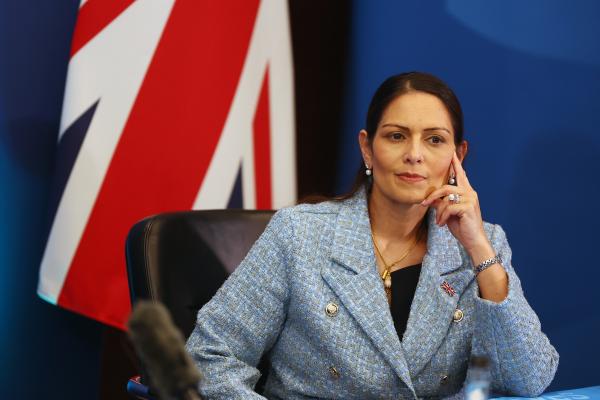
UK Shadow Secretary of State for Foreign, Commonwealth, and Development Affairs the Rt. Hon. Priti Patel, MP, will join Hudson for a conversation on the future of the special relationship and what the adoption of a conservative foreign policy would mean for Britain and the transatlantic alliance.
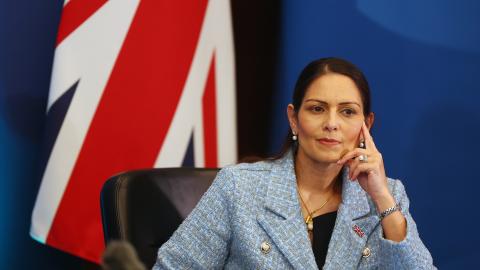

Join Distinguished Fellow Mike Gallagher and Congressman Rob Wittman (R-VA) for a discussion on the congressman’s recently introduced Securing Essential and Critical US Resources and Elements (SECURE Minerals) Act and Congress’s role in securing America’s economic security.

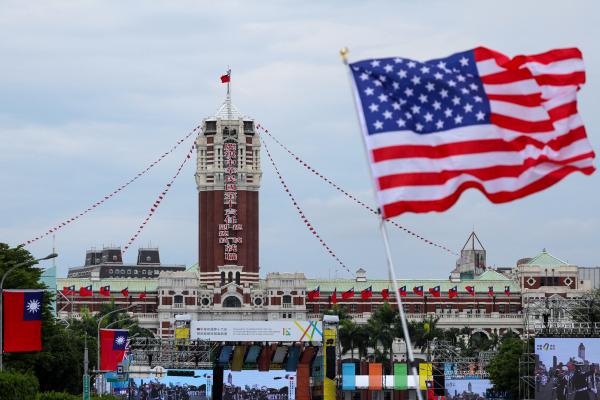
Join Hudson for an expert panel on why these deals are so important for both nations, what they mean for the future of US supply chains, and what potential challenges remain for implementing these deals.
